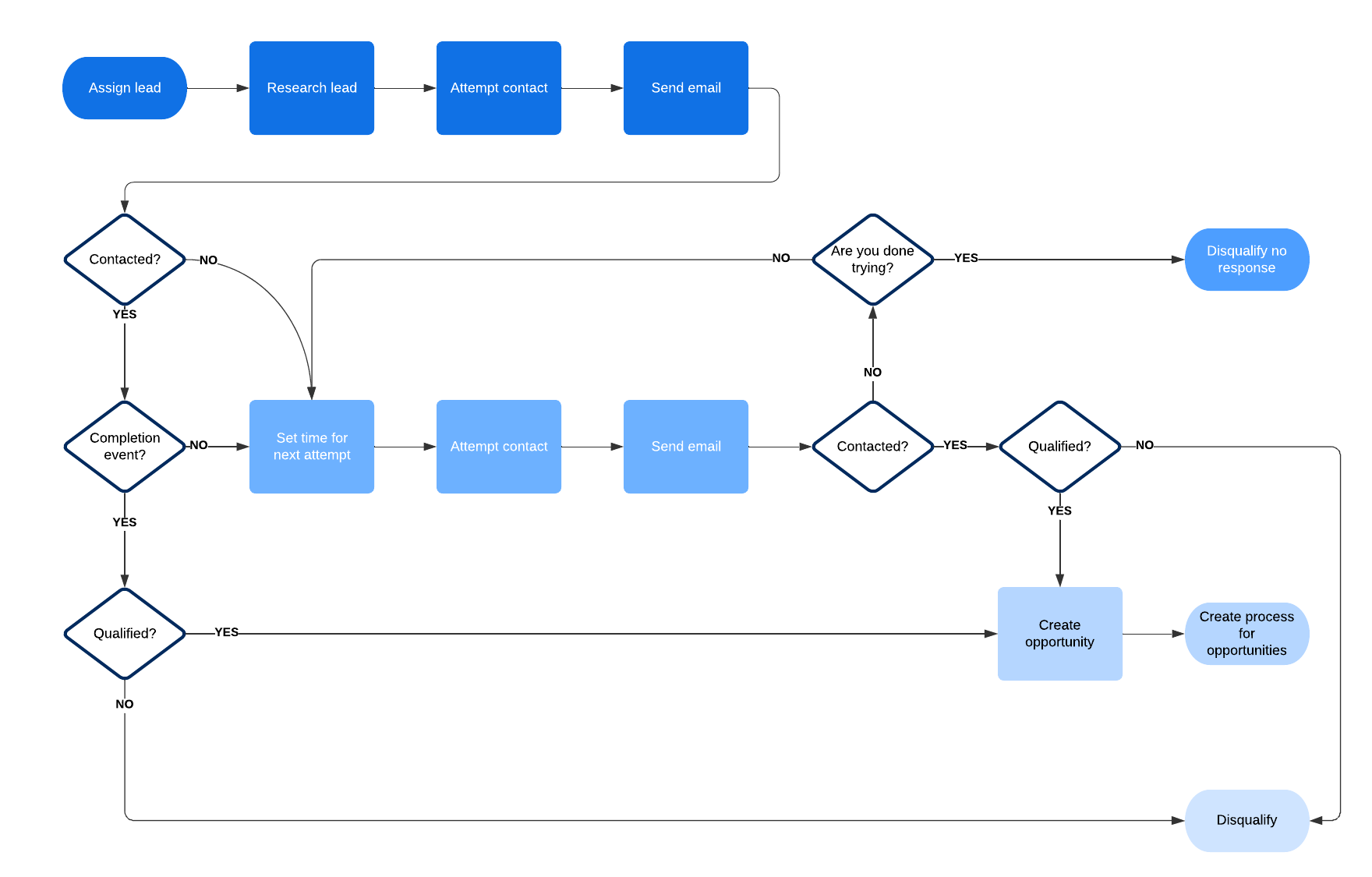With the rise of big data, cloud technology, and sophisticated sales tools, sales operations have become increasingly important to the success of an organization’s sales department.
But what exactly is sales ops? And what do they do?
Below we break down the goals, functions, and best practices of today’s modern sales operations teams.
What is sales operations?
The term “sales operations” covers a lot of ground and can mean different things to different teams and organizations. The first iterations of the sales operations model have been around since the 1970s, and they focused primarily on analyzing data to provide insights and direction to sales reps. Today, the objectives and roles of sales operations are much broader.
At its core, sales operations is about supporting and enabling frontline sales teams to sell more efficiently and effectively by providing strategic direction and reducing friction in the sales process. To do this, sales ops fulfills both strategic and tactical functions.
There are several advantages to implementing a formal sales operations team:
- Data-driven strategy and decision making
- Streamlined sales processes
- Improved recruiting and hiring practices
- More effective onboarding and employee training programs
- Higher productivity and sales from strategic sales coverage models and territory planning
- Smoother operations management that allows sales reps to focus on selling
- More sales!
Sales ops vs. sales enablement
The delineation between sales ops and sales enablement is squishy. In fact, many people use the terms interchangeably, and there is often overlap in each team’s roles.
The overarching goal for each team is the same: to increase sales effectiveness and efficiency in order to drive greater revenue.
So what’s the difference?
Organizations define each team and their roles differently. However, sales enablement teams typically focus on supporting sales reps on the ground, often in the earlier stages of the sales funnel.
On the other hand, sales ops tend to oversee higher-level support functions—such as territory mapping, tech management, and reporting—and focus primarily on enabling sales later in the cycle (e.g., contract negotiation and closing).
Because the structure and responsibilities of sales operations and sales enablement teams differ between organizations, we will include a broader scope of potential roles under the sales ops umbrella.
What are the roles of sales operations?
Sales operations teams accomplish their goals through a variety of roles and functions, including strategy, data analysis, hiring and training, forecasting, territory design, and sales process optimization.
While the exact structure and functions will vary from business to business, generally, the role of sales operations can be defined under four main categories:
- Strategy
- Technology
- Operations
- Performance
Here’s a brief breakdown of the primary roles of a sales ops team.
Strategy
One of the main roles of sales ops is to define a high-level vision for the sales organization and develop strategies to meet those goals.
A few of their strategic functions might include:
- Sales process optimization
- Sales technology and methodology evaluation
- Sales coverage model and territory planning
- High-level planning and goal setting
- Data analysis
- Sales forecasting
Technology
Over the past several years, there has been an exponential increase in the SaaS applications and other sales tools available to organizations. While better data and technology can promote sales, the complexity of multiple platforms can overwhelm sales reps and turn into a timesuck on the sales floor.
That’s where sales ops come in. Their job is to manage the sales tech stack so the sales reps can focus on selling.
Here are a few ways they do that:
- Integration of apps and tools
- Adoption and customization of a CRM
- Communications management
- Data management and reporting
- Task automation
Operations
Sales ops contribute to high performance and expertise throughout the sales department by assuming the burden of administrative and operational tasks. With the help of data analysis and process optimization, sales ops teams can take the lead on training, hiring, and knowledge management to ensure their sales reps have the information and skills to succeed on the sales floor.
Operational tasks and responsibilities include:
- Product training
- Sales training
- Hiring and onboarding top talent
- Market intelligence support
- Contracts and SLAs
- KB management
Performance
Finally, sales ops seek to improve performance and productivity by eliminating barriers and smoothing processes for the sales reps.
Sales ops may focus on the following performance priorities:
- Implementation of sales methodologies and best practices
- Identifying KPIs and sales metrics
- Compensation and incentive plans
- Lead management
How to run a successful sales operations team
Running a sales operations team is a big job. Try out these best practices to ensure success.
1. Create a formal mission for the sales operations team
It’s easy to become enamored by flashy buzzwords like sales ops. But without a defined purpose and mission, your sales operations team is destined for failure.
Don’t create sales ops without a clear objective. Otherwise, you’ll be creating more work for the organization and diverting valuable resources away from the tasks and initiatives that need it most. Be sure your sales ops team has a clearly defined mission statement and key objectives. This purpose will guide the team’s strategy, decision-making, and functions for a more effective role in the organization.
2. Establish best practices and scalable processes
One of the sales ops team’s most valuable contributions to a sales department comes from managing and scaling processes. Your sales operations should be the central hub for your organization’s best practices and standards for all sales functions and materials.
By evaluating, documenting, implementing and communicating the company’s best practices and formal processes, the organization will operate more efficiently because everyone will be on the same page and apply methods and practices consistently.
For best results, the sales ops team should ensure that standards and processes are clearly documented and accessible in a central knowledge base or resource center. Updates and changes should also be communicated clearly across the most effective channels to ensure smooth transitions.

3. Clearly define sales ops vs. sales enablement responsibilities
Because sales ops and sales enablement have similar objectives and roles, it’s easy for the two teams to overlap into messy confusion. To avoid redundancies and miscommunications, be sure to define the specific functions and responsibilities for each team.
By establishing a clear delineation, both teams can operate more effectively and efficiently to support each other and the sales department as a whole.
4. Prioritize customer success and retention
The best sales ops teams not only help sales reps find the best leads, but they also focus on driving success and retaining those customers in the long run. Sales ops is particularly well suited for this role because they have in-depth knowledge and understanding of the customer base.
Armed with data and research, the sales ops team can leverage that expertise to improve sales training, support sales reps during tricky negotiations or pricing conflicts, and improve outcomes after the sale.
While the sales rep still has the primary responsibility for managing customer satisfaction, the sales ops team can support their efforts by communicating and sharing key information and insights regarding their accounts.
5. Collaborate with other teams
While sales operations should be discreet from sales enablement, that doesn’t mean you shouldn’t work closely. The primary role of sales operations is to support and optimize the sales process for everyone.
Check-in with other teams, including enablement, marketing, and sales to make sure your efforts are focused on the right issues and you aren’t duplicating work. Schedule weekly or bi-weekly leadership meetings with the other teams to stay updated and aligned.
Improve the sales cycle with Lucidchart
Sales operations has a big job to do. But as your organization grows, adopting a sales operations model with a defined sales ops team can help you grow strategically while optimizing gains. Lucidchart helps sales ops teams support their reps and improve their sales cycle at every stage.
Use Lucidchart to:
- Import your Salesforce schema to visualize potential changes and optimizations to your CRM.
- Visually document best practices and sales processes to optimize your sales cycle, identify inefficiencies, and reduce bottlenecks.
- Quickly onboard new hires and train teams on updated processes through easy-to-digest visuals.
- Establish a central knowledge base for your documentation, data, and processes so everyone has the most up-to-date information and resources.
An intuitive interface, smart sharing options, and key integrations with Salesforce makes Lucidchart obvious for the busy sales ops team.

Learn how Lucidchart can help your team close bigger deals faster.
Learn moreAbout Lucidchart
Lucidchart, a cloud-based intelligent diagramming application, is a core component of Lucid Software's Visual Collaboration Suite. This intuitive, cloud-based solution empowers teams to collaborate in real-time to build flowcharts, mockups, UML diagrams, customer journey maps, and more. Lucidchart propels teams forward to build the future faster. Lucid is proud to serve top businesses around the world, including customers such as Google, GE, and NBC Universal, and 99% of the Fortune 500. Lucid partners with industry leaders, including Google, Atlassian, and Microsoft. Since its founding, Lucid has received numerous awards for its products, business, and workplace culture. For more information, visit lucidchart.com.
Related articles
How to structure your sales organization for success
The way you structure your sales organization can have lasting consequences for your business’s long-term success. Take a look at three common sales team models as well as best practices for creating a successful organization.
5 steps to creating a data-driven sales organization
Modern sales teams are increasingly looking to data and data analysis to inform their decision-making and improve sales performance. Take a look at how you can build your own data-driven sales organization.
